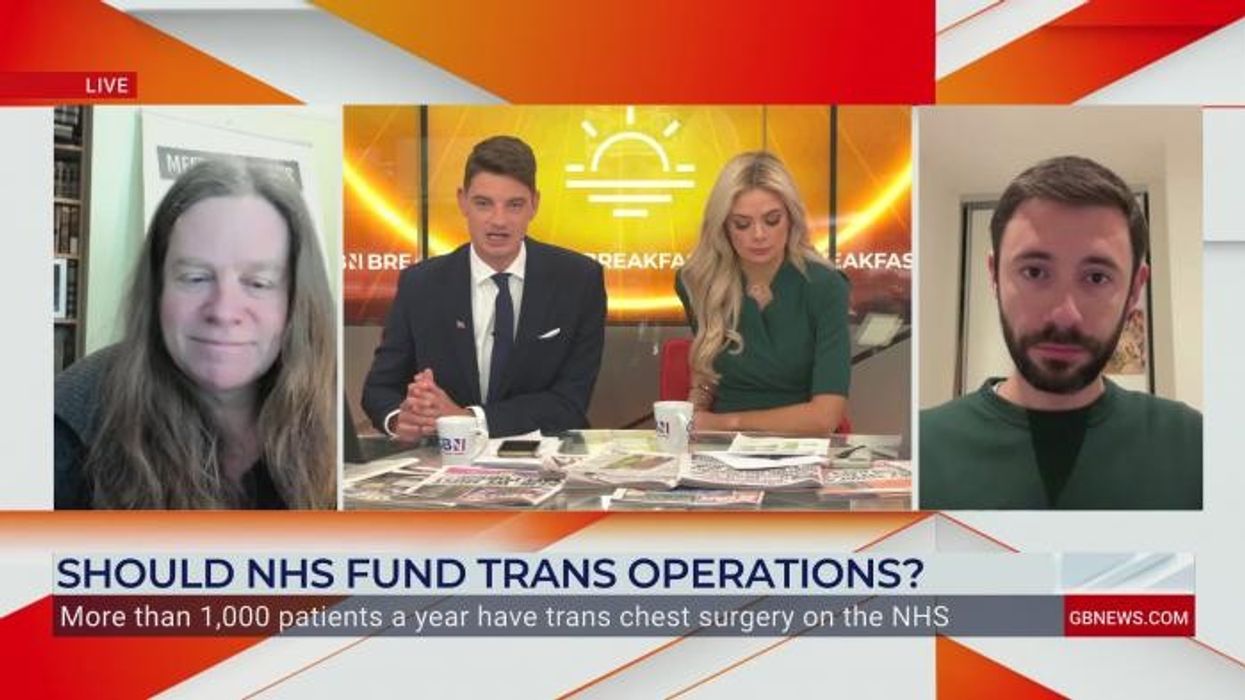Campaigner blasts doctors for performing trans breast surgeries and claims they should 'be in PRISON' in furious debate

Experts have raised concerns about the lack of evidence supporting these procedures' benefits
Don't Miss
Most Read
Latest
A heated debate erupted on GB News over NHS-funded transgender chest surgeries, with campaigner James Esses calling for doctors performing such procedures to "end up in prison".
Esses argued the surgeries should be classified as grievous bodily harm under the law, comparing them to other forms of extreme body modification.
Diversity consultant Katy Jon Went defended the procedures, maintaining they provide necessary relief for psychological distress when properly regulated.
Founder of Just therapy James Esses said on GB News: "Not only should these procedures not be provided on the NHS, but clinicians that provide them should end up in prison.
"This should be categorised as grievous bodily harm under the law, as we have for many other forms of extreme body modification.

A spokesperson confirmed the health service is conducting a "wide-ranging review" of adult gender services
|GB News
"So you're talking specifically about chest surgeries. I'm talking about any form of surgery for gender dysphoria, as we call it, which involves irreversibly amputating healthy parts of people's bodies, including their breasts and their genitals."
Diversity and Inclusion Facilitator Katy Jon Went argued: "Well, we do a number of kind of physical surgeries for psychological reasons.
LATEST DEVELOPMENTS
- 'I'm biologically female!' Trans NHS doctor adamant trans women have right to get changed in front of female colleagues
- 'This is part of the problem!' 100-year-old D-Day veteran suspended from the Green Party over trans comments
- NHS covers 1,000 trans chest surgery patients every year as alarm bells raised about taxpayers funding 'cruelty for parents'
"I absolutely believe there should be many, many, many gatekeeping checks. And for that, I'm not very popular amongst trans communities.
"I do believe that psychological safeguards should exist. There should be multiple sign offs on anything, but we do cosmetic breast surgeries for those with other psychological concerns of the cancer gene and therefore the fear and leading to removals, people having reductions, people having reconstructions, and people who have breasts are of different size, people I know who have had those kind of equalised in that sense.
"We do them for multiple reasons, but the psychological sign offs have to be very, very thorough."
Esses fumed: "I'm afraid what's just been said is a complete and utter lie. We do not offer irreversible mutilation of bodily parts for psychological issues in this country.
"This is not cosmetic procedure. This is not breast reduction. This is removing healthy parts of somebody's body, and then it's ceasing to have its proper functionality.
 Many are taking to platforms such as GoFundMe to set up fundraisers for their gender affirming “top surgery” | PA
Many are taking to platforms such as GoFundMe to set up fundraisers for their gender affirming “top surgery” | PAWent explained: "It worked for me. It relieved my distress and I'm now a happier individual.
"Living in society and getting on with my life because I no longer have this hanging over my head. And I think that for some people it is still, yes, an extreme situation, but it does get signed off by people who know what they're doing."
Experts have raised concerns about the lack of evidence supporting these procedures' benefits.
Zhenya Abbruzzese, co-founder of the Society for Evidence Based Gender Medicine, pointed to "clear harms" for those who later regret their decision.
"We are concerned that young people are being told that these procedures will relieve their distress when the research cannot find the benefits," she said.
Citing a McMaster University review of over 1,300 studies, Abbruzzese noted there is "no evidence that it improves mental health and overall functioning."
The Bayswater Support Group called it "particularly cruel" that taxpayers fund surgeries they claim mislead women about resolving psychological distress.
The NHS defended its current practices, stating that chest surgeries are only provided to "adult patients who have a clinical diagnosis of gender dysphoria from a specialist NHS clinic."
A spokesperson confirmed the health service is conducting a "wide-ranging review" of adult gender services.
This review "will inform a revised service specification to set out how we will support patients with gender dysphoria in future," the NHS added.











